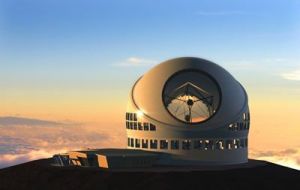MercoPress. South Atlantic News Agency
Chile is the world’s leader in star gazing with the most powerful telescopes
 Only Antarctica and the space offer better observation advantages
Only Antarctica and the space offer better observation advantages Many of the world’s largest investments in the field of astronomy can be found in Chile for the same reasons that Cerro Armazones, in the Antofagasta region, may become home to a new telescope that would produce images 15 times shaper than the Hubble telescope.
The E-ELT (European Extremely Large Telescope) aspires to make discoveries from far off stars to the origins of the Universe.
A series of near-perfect conditions such as dry clear nights, low light pollution, and high elevations, have made Chile a favourite location for research observatories. Diego Mardones, Astronomer from the University of Chile comments, “If you want to find another [observation area] like Chile, your options are Antarctica or space”.
It’s no surprise that Chile provides the view for 40% of worldwide astronomical observation and with the addition of three new telescopes, LSST (Large Synoptic Survey Telescope), GMT (Giant Magellan Telescope), and the Alma (Atacama Large Millimeter/submillimeter Aray), Chile will produce over 50% of worldwide astronomical viewing.
The highest telescope in the world, The University of Tokyo Atacama Observatory (TAO), and the powerful European Southern Observatory VLT (Very Large Telescope) are two observatories that have made the skies of the northern desserts of Chile famous.
Over the past decade Chile received approximately one billion USD in foreign investment for high profile observatories. Enormous projects such as the E-ELT would also encourage Chilean students and researchers to devote their expertise to the field.
Maria Elena Boisier, president of the National Commission of Science and Technology, comments that receiving the E-ELT, “would represent an unprecedented boost for Chilean astronomy and related sciences, like engineering and information technology.”
By Callan Hetterich - Santiago Times




Top Comments
Disclaimer & comment rulesCommenting for this story is now closed.
If you have a Facebook account, become a fan and comment on our Facebook Page!